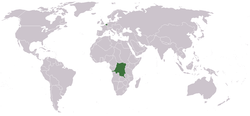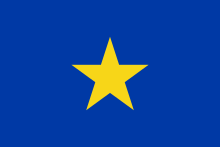International Association of the Congo
| International Congo Society | ||||||||||
| Association internationale du Congo | ||||||||||
| Provisional government | ||||||||||
| ||||||||||
 | ||||||||||
| Capital | Boma | |||||||||
| Political structure | Provisional government | |||||||||
| Owner | Leopold II of Belgium | |||||||||
| Chairman | Maximilien Strauch | |||||||||
| Plenipotentiary | Henry Morton Stanley | |||||||||
| Historical era | New Imperialism | |||||||||
| • | Established | November 17, 1879 | ||||||||
| • | Flag recognized | April 10, 1884 | ||||||||
| • | Sovereignty recognized | November 8, 1884 | ||||||||
| • | Free state established | July 1, 1885 | ||||||||
| ||||||||||
The International Association of the Congo (French: Association internationale du Congo), also known as the International Congo Society, was an association founded on November 17, 1879, by Leopold II of Belgium to further his interests in the Congo. It replaced the Belgian "Committee for the Study of the Upper Congo" (French: Comité d'études du Haut-Congo), which was part of the International African Association created for exploration of the Congo. The goals of the International Congo Society was to establish control of the Congo basin and to exploit its economic resources. The Berlin Conference recognized the society as sovereign over the territories it controlled and in 1885 its structures were acquired by the Congo Free State.
Ownership and control
The official stockholders of the Committee for the Study of the Upper Congo were Dutch and British businessmen and a Belgian banker who was holding shares on behalf of Leopold. Colonel Maximilien Strauch, president of the committee, was a henchman of Leopold. It was not made clear to Henry Morton Stanley, who signed a five-year contract to establish bases in the Congo in 1878, whether he was working for the International African Association, the Committee for Study of the Upper Congo, or Leopold himself. Stanley's European employee contracts forbade disclosure of the true nature of their work. [1]
Berlin Conference
The Berlin Conference or Congo Conference of 1884–85 regulated European colonization and trade in Africa. King Leopold II was able to convince the powers at the conference that common trade in Africa was in the best interests of all countries. The General Act of the conference divided Africa between the main powers of Europe and confirmed the territory controlled by the Congo Society as its private property, which essentially made it the property of Leopold II.
On April 10, 1884, United States Senate authorized President Chester A. Arthur "to recognize the flag of the AIC as the equal of that of an allied government". On November 8, 1884, Germany recognized the sovereignty of the society over the Congo.
See also
External links
- Timeline for Congo — History Commons
References
- ↑ Adam Hochschild (1999). "King Leopold's Ghost: A Story of Greed, Terror, and Heroism in Colonial Africa". Houghton Mifflin Harcourt.
